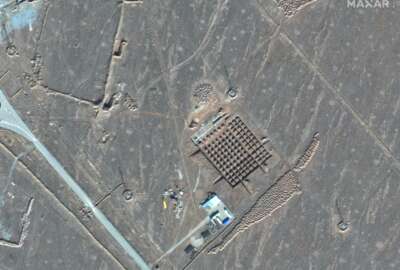

The National Reconnaissance Office wants to take advantage of commercial innovation more quickly than it has in the past.
ST. LOUIS — The National Reconnaissance Office is looking to more quickly take advantage of what it calls “an explosion” of commercial innovation in the space industry through a new, open-ended contracting vehicle.
Chris Scolese, director of the NRO, said the agency will release a new Broad Agency Announcement (BAA) in the next “month or so.” The move will allow NRO “to evaluate, leverage and even integrate new and emerging technologies and phenomenologies, like radar, hyperspectral and [radio-frequency] sensing as they become available,” Scolese said here at the GEOINT 2021 Symposium.
“We have to innovate faster,” he said. “We can’t rely on the standard contracting approach, which, while it goes reasonably fast, it still takes time. And ideas come quickly, and new technologies are being developed every day. But more importantly, new ways to employ technology are happening even faster.”
The BAA, called “Strategic Commercial Enhancements,” will also give new companies a chance to work with the secretive agency, according to Pete Muend, director of NRO’s Commercial Systems Program Office.
“As other companies are able to offer capabilities that can maybe meet some of our needs, we’ll look at that as a mechanism to get them on board and leverage those capabilities,” he told a small group of reporters here. “And then also to potentially provide some direct support, some direct funding for providers to do some additional things for us that may not fall into a purely commercial side, but maybe have them move along a little bit more to satisfy some of the unique needs that we have.”
Muend said there will likely be “multiple vendors and multiple contracts” involved in the BAA. The process starts with NRO soliciting white papers for a specific need. The agency then has the option to seek formal proposals.
“There is a proposal afterwards and an RFP, but it is in an accelerated timeline and a bit quicker than a standard source selection,” Muend said.
The new BAA approach is a continuation of an initiative over the last several years where NRO has been testing commercial satellite technologies.
“As the industry matures and is able to better satisfy those needs and provide data, obviously we’re going to be walking right alongside them to be able to use that data, both in the near term and then obviously increasing the level of maturity over time, and ultimately ending up in a long term program of record,” Muend said.
NRO said it plans to issue multiple focus areas multiple times per year through the BAA framework. The first focus will be commercial radar applications, an area the agency has already been looking at in conjunction with the increased availability of synthetic aperture radar (SAR) satellite constellations.
The commercial radar area will also be open to U.S. subsidiaries of foreign-owned companies, officials said. Some of the largest SAR firms, for instance, are based in Europe and Israel.
Intelligence officials have committed to using more commercially available technologies. The intelligence community established a Commercial Space Council last year to determine how to work more closely with the expanding market. But officials still express lingering concerns about the security and resiliency of using products and data available on the open market.
“The BAA is as a kind of a very first introduction exploring those sorts of things, so it’s probably a lighter touch with regard to some of the security controls and those sorts of things, but certainly there’s an evolutionary path there and as we develop a closer relationship we’ll have more and more expectations over time,” Muend said.
Copyright © 2024 Federal News Network. All rights reserved. This website is not intended for users located within the European Economic Area.
Follow @jdoubledayWFED


